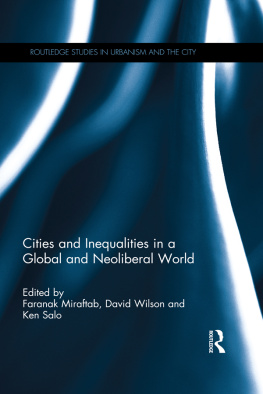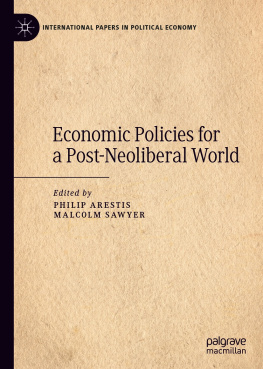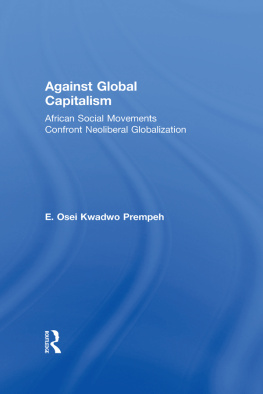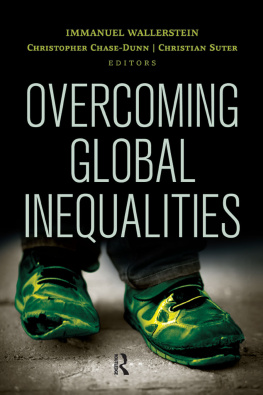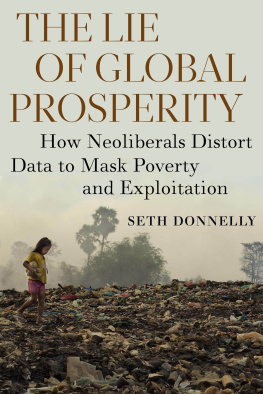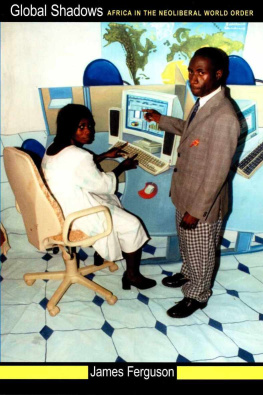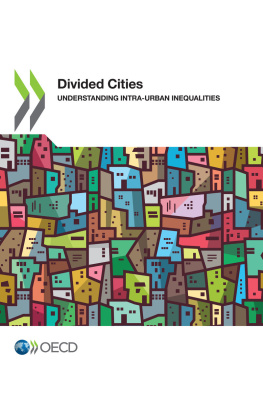Cities and Inequalities in a Global and Neoliberal World
Cities continue to be key sites for the production and contestation of inequalities generated by an ongoing but troubled neoliberal project. Neoliberalisms onslaught across the globe now shapes diverse inequalities poverty, segregation, racism, social exclusion, homelessness as city inhabitants feel the brunt of privatization, state re-organization, and punishing social policy. Cities and Inequalities in a Global and Neoliberal World examines the relationship between persistent neoliberalism and the production and contestation of inequalities in cities across the world. Case studies of current city realities reveal a richly place-specific and generalizable neoliberal condition that further deepens the economic, social, and political relations that give rise to diverse inequalities. Diverse examples also show how people struggle against a neoliberal ethos and hence the open-endedness of futures in these cities.
Faranak Miraftab is Professor in the Department of Urban and Regional Planning at the University of Illinois, Urbana-Champaign, where she teaches on globalization and transnational planning. Her research, grounded in the experience of cities in Latin America, South and West Africa and the United States, concerns the global and local contingencies involved in the formation of the city and citizens struggle to access urban space and socio-economic resources.
David Wilson is Professor and Graduate Director in the Geography Department at the University of Illinois, Urbana-Champaign. He also holds appointments in Urban Planning, African-American Studies, and the Unit for Criticism and Interpretive Theory. His current work focuses on urban politics, production of inequality, and constructions of marginalized populations in cities of the global West.
Ken E. Salo teaches at the Department of Urban and Regional Planning at the University of Illinois, Urbana-Champaign, in the areas of environmental justice, environmental racism, law and international environmental policy, global justice movements, international development and planning.
ROUTLEDGE STUDIES IN URBANISM AND THE CITY
This series offers a forum for original and innovative research that engages with key debates and concepts in the field. Titles within the series range from empirical investigations to theoretical engagements, offering inter- national perspectives and multidisciplinary dialogues across the social sciences and humanities, from urban studies, planning, geography, geo- humanities, sociology, politics, the arts, cultural studies, philosophy and literature.
Published
THE URBAN POLITICAL ECONOMY AND ECOLOGY OF AUTOMOBILITY
Driving cities, driving inequality, driving politics
Edited by Alan Walks
CITIES AND INEQUALITIES IN A GLOBAL AND NEOLIBERAL WORLD
Edited by Faranak Miraftab, David Wilson and Ken E. Salo
Forthcoming
MEGA-URBANIZATION IN THE GLOBAL SOUTH
Fast cities and new urban utopias of the postcolonial state
Edited by Abdul Shaban and Ayona Datta
First published 2015
by Routledge
2 Park Square, Milton Park, Abingdon, Oxon OX14 4RN
and by Routledge
711 Third Avenue, New York, NY 10017
Routledge is an imprint of the Taylor & Francis Group, an informa business
2015 Faranak Miraftab, David Wilson and Ken E. Salo
The right of the editors to be identified as the authors of the editorial material, and of the authors for their individual chapters, has been asserted in accordance with sections 77 and 78 of the Copyright, Designs and Patents Act 1988.
All rights reserved. No part of this book may be reprinted or reproduced or utilised in any form or by any electronic, mechanical, or other means, now known or hereafter invented, including photocopying and recording, or in any information storage or retrieval system, without permission in writing from the publishers.
Trademark notice: Product or corporate names may be trademarks or registered trademarks, and are used only for identification and explanation without intent to infringe.
British Library Cataloguing in Publication Data
A catalogue record for this book is available from the British Library
Library of Congress Cataloging in Publication Data
Cities and inequalities in a global and neoliberal world / edited by Faranak
Miraftab, David Wilson and Ken E. Salo.
(Routledge studies in urbanism and the city)
Includes bibliographical references and index.
1. UrbanizationSocial aspects. 2. Sociology, Urban. 3. Equality.
4. Neoliberalism. 5. Urban economics. I. Miraftab, Faranak.
HT151.C568326 2015
307.76dc23 2014046671
ISBN: 978-0-415-70598-1 (hbk)
ISBN: 978-1-315-88759-3 (ebk)
Typeset in Sabon
by Keystroke, Station Road, Codsall, Wolverhampton
Contents
DAVID WILSON, FARANAK MIRAFTAB AND KEN E. SALO
DAVID FASENFEST
DAVID WILSON AND FARANAK MIRAFTAB
KATHERINE HANKINS, MECHELLE PUCKETT, DEIRDRE OAKLEY AND ERIN RUEL
DIANE E. DAVIS
MARTIN J. MURRAY
VIRG MOLNR
NEEMA KUDV A
MI SHIH
ERIK SWYNGEDOUW
MARK PURCELL
RYAN GRIFFIS AND SARAH ROSS
KEN E. SALO
Diane E. Davis is Professor of Urbanism and Development at the Graduate School of Design, Harvard University. Her works examine the relations between urbanization and national development, comparative international development, the politics of urban development policy, and conflict cities. She is the author of Urban Leviathan: Mexico City in the Twentieth Century (Temple, 1994) and Discipline and Development: Middle Classes and Prosperity in East Asia and Latin America (Cambridge, 2004).
David Fasenfest , Associate Professor of Sociology, Wayne State University, is the editor of Critical Sociology and Studies in Critical Social Science . He writes about regional and urban economic development, and income inequality. Recent publications include Engaging Social Justice: Critical Studies of 21st Century Social Transformation (2010), and Social Change, Resistance and Social Practice (Haymarket, 2011).
Ryan Griffis is an artist currently teaching new media art at the University of Illinois, Urbana-Champaign. Under the name Temporary Travel Office, Ryan creates work and publications that attempt to use tourism as an opportunity for critical public encounters. For the past several years, he has worked with two groups (Compass Collaborators and Regional Relationships) to explore the impacts of, and responses to, neoliberalism in the Midwest.
Katherine Hankins is an Associate Professor of Geography in the Department of Geosciences at Georgia State University. She is an urban geographer, whose expertise is in the policies and politics of neighborhood change. Her work has focused on the politics around urban redevelopment projects, housing, and schooling, primarily in Atlanta, Georgia. Her research has been published in Urban Studies , International Journal of Urban and Regional Research , Antipode , Urban Geography , Journal of Urban History, Social and Cultural Geography , and Environment and Planning A, among others.
Neema Kudva is Associate Professor in the Department of City and Regional Planning at Cornell University. She directs the International Studies in Planning Program and is faculty lead of the Nilgiris Field Learning Center, an interdisciplinary collaborative project of Cornell and the Keystone Foundation, India. Kudvas research focuses on institutional structures that undergird planning at the local level, and contemporary urbanization, particularly issues related to small cities and their regions.

